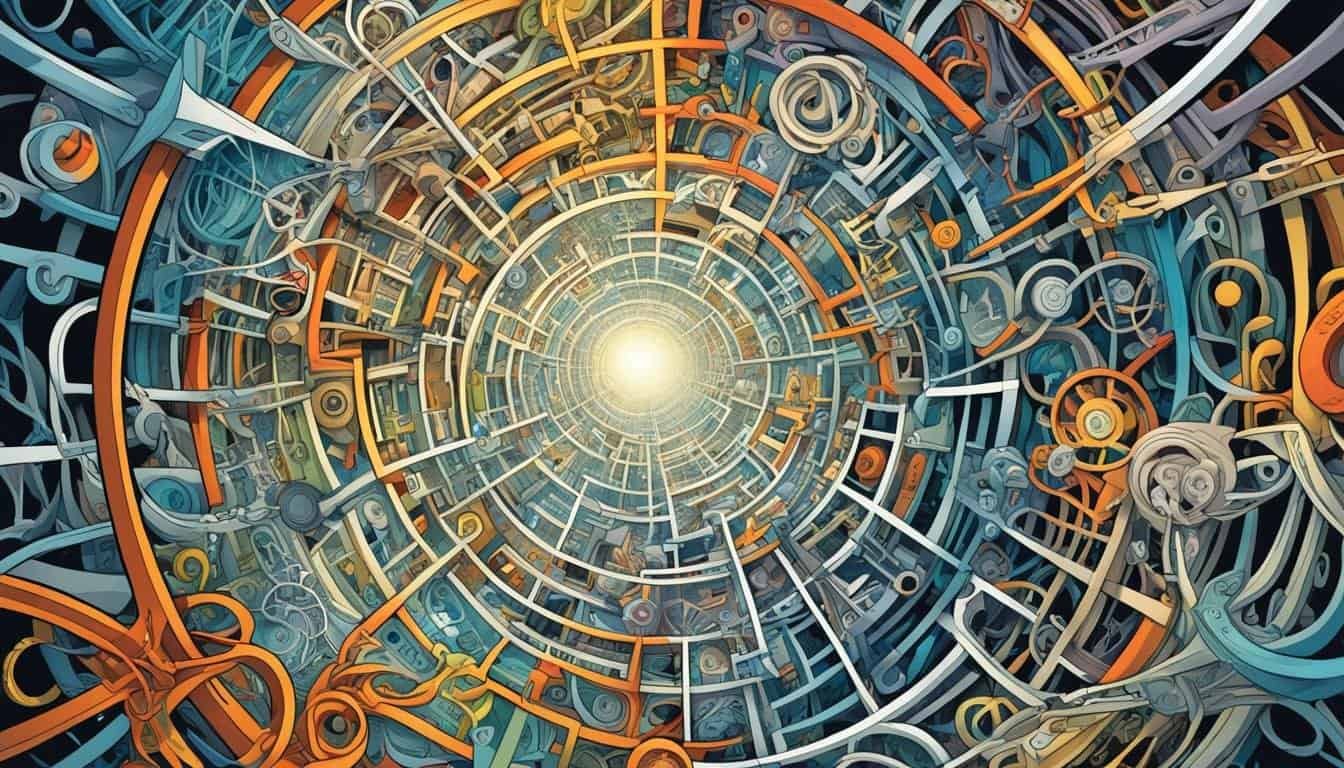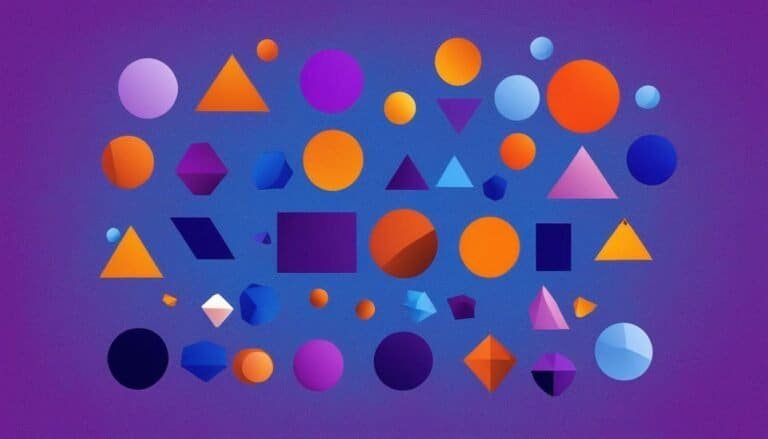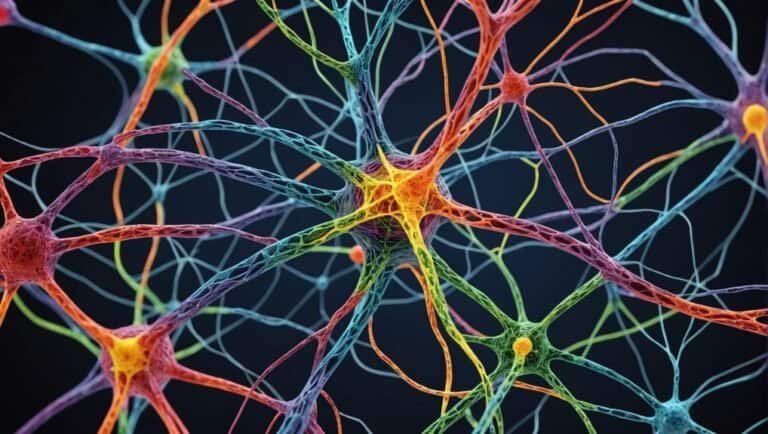Exploring the Depths of Psychological Symbolism
“The symbolic language of the unconscious is the image.” – Carl Jung
Depth psychology, with its profound exploration of the human psyche, unveils the hidden layers of our consciousness and reveals the power and significance of symbols residing within us. From Sigmund Freud’s psychoanalytic symbolism to Carl Jung’s archetypal exploration, depth psychology offers valuable insights into the depths of the mind.
In this article, we will delve into the world of psychological symbolism, examining its symbolic meaning, psychoanalytic interpretation, and the profound impact it has on personal growth and self-discovery. Get ready to embark on a journey of introspection, unlock the hidden treasures of your unconscious mind, and gain a deeper understanding of yourself and the world around you.
Key Takeaways:
- Psychological symbolism explores the profound interplay of conscious and unconscious elements in shaping thoughts, behaviors, and emotions.
- Symbols reside in the unconscious mind, and their interpretation provides insights into our true selves.
- Depth psychology, including psychoanalytic theory and Carl Jung’s archetypal psychology, offers valuable tools for self-discovery and personal growth.
- The exploration of psychological symbolism leads to a deeper understanding of oneself and the world.
- By uncovering the symbolic language of the unconscious, we unlock the potential for transformation and self-actualization.
Understanding Depth Psychology
Depth psychology delves into the profound intricacies of the human mind, uncovering the hidden layers that lie beyond our conscious thoughts and actions. This field of study acknowledges the existence of the conscious and the unconscious, exploring the depths of the psyche in search of deeper meaning and understanding. By embracing the concept of the unconscious, depth psychology recognizes that our thoughts and behaviors are influenced by repressed memories, desires, and archetypal symbols.
“Depth psychology is an exploration of the hidden dimensions within us. It reveals the mysteries that reside in the depths of the psyche, allowing us to gain a clearer vision of our true selves.”
– Dr. Elizabeth Young, Psychologist
In the hidden layers of the psyche, we find a wealth of information that can provide valuable insights into our personal growth and self-discovery. The unconscious mind holds the key to unresolved conflicts, emotional wounds, and unexplored aspects of our identity. By carefully examining these hidden layers, we can gain profound insights into who we are and what drives us.
Archetypal symbols play a significant role in depth psychology. These universal symbols are deeply embedded in our collective unconscious and carry profound meaning and significance. By exploring these archetypes, we can uncover the hidden layers of our being, tap into our innate wisdom, and embark on a journey of self-transformation.
To illustrate the interplay between the conscious and the unconscious, depth psychology offers various therapeutic techniques. These techniques include introspection, dream analysis, free association, and symbolic interpretation. Through these practices, individuals can gain a deeper understanding of their innermost thoughts and desires, unlocking the potential for growth and healing.
Exploring the Conscious and Unconscious
At the core of depth psychology lies the exploration of the conscious and unconscious aspects of the mind. The conscious mind represents our immediate awareness of thoughts, feelings, and sensations. It encompasses our rational thinking and logical reasoning.
On the other hand, the unconscious mind houses the hidden layers of the psyche. It contains a vast reservoir of repressed memories, experiences, and emotions that influence our conscious thoughts and behaviors. The unconscious is like an iceberg, with only a small portion visible above the surface while the majority remains hidden beneath.
Through in-depth exploration and analysis, depth psychology seeks to bridge the gap between the conscious and the unconscious, enabling individuals to gain a comprehensive understanding of themselves and their experiences.
Diving into Symbols and Archetypes
Archetypal symbols are powerful tools for understanding the human psyche. These symbols, such as the hero, the mother, or the wise old man, are deeply ingrained in our collective consciousness and reflect fundamental aspects of the human experience. By exploring these archetypes, we tap into the universal wisdom that resides within us.
Symbolic interpretation is a key practice in depth psychology, allowing us to decipher the hidden meaning behind dreams, myths, and everyday experiences. Symbols act as gateways to the unconscious, providing insights into our desires, fears, and aspirations.
| Symbol | Meaning |
|---|---|
| Water | Emotions, the unconscious |
| Tree | Growth, stability, connection to nature |
| Mirror | Self-reflection, introspection |
| Sun | Life, vitality, enlightenment |
“Symbols are the language of the unconscious. They provide a roadmap to the hidden layers of our being, allowing us to access the depths of our psyche.”
Understanding these symbols and archetypes enables us to gain insights into our personal growth, relationships, and life’s purpose. By embracing the hidden layers of the psyche, depth psychology offers us a pathway to self-discovery and transformation.
The Power of a Mindset Shift
A mindset shift can have a profound impact on an individual’s journey to success, unlocking their inner genius and fostering lasting happiness. By embracing a new perspective, individuals can tap into their hidden potential, overcome obstacles, and experience personal growth.
Accelerating Success
A mindset shift is a catalyst for success. When individuals shift their mindset from a fixed mindset to a growth mindset, they open themselves up to new possibilities and opportunities. By embracing challenges, learning from failures, and persisting through obstacles, they develop resilience and the ability to achieve their goals.
Unleashing Inner Genius
Shifting one’s mindset can reveal the inner genius that lies within. By embracing a growth mindset, individuals believe in their ability to learn, adapt, and improve. They are not limited by self-doubt or fear of failure, but instead, they explore their creative potential, think outside the box, and innovate.
“The only limit to our realization of tomorrow will be our doubts of today.” – Franklin D. Roosevelt
Nurturing Lasting Happiness
Mindset shifts have the power to bring about long-lasting happiness. By embracing a positive mindset, individuals cultivate gratitude, optimism, and resilience. They focus on their strengths, find joy in the present moment, and build fulfilling relationships. Happiness becomes an intrinsic part of their lives, independent of external circumstances.
It is essential to recognize that a mindset shift is not an overnight transformation. It requires consistent effort, self-reflection, and a belief in one’s ability to change. With patience and perseverance, individuals can navigate their personal growth journey and unleash their true potential.
| Mindset Shift Benefits | Success | Inner Genius | Happiness |
|---|---|---|---|
| Accelerates personal and professional growth | Unlocks creative potential and innovation | Builds resilience and adaptability | Cultivates gratitude and optimism |
| Overcomes obstacles and setbacks | Fosters a growth mindset | Encourages exploration and learning | Develops self-acceptance and positive relationships |
| Creates a sense of purpose and meaning | Fuels curiosity and a hunger for knowledge | Promotes self-confidence and empowerment | Enhances overall well-being and life satisfaction |
The Unconscious Mind: The Hidden Terrain
Depth psychology recognizes the unconscious mind as a rich reservoir of untapped potential and hidden knowledge. It comprises the personal unconscious, housing individual experiences, and the collective unconscious, holding universal human experiences and archetypes. Accessing these hidden layers provides a deeper understanding of oneself and the forces shaping life.
The unconscious mind is a mysterious realm within each of us, operating below the surface of conscious awareness. It is where our deepest desires, fears, and memories reside, influencing our thoughts, emotions, and behaviors in ways we may not fully comprehend.
Within the personal unconscious, each individual’s unique life experiences are stored. This includes memories, traumas, and unresolved emotions that have been swept away from conscious awareness. These hidden aspects of ourselves can have a profound impact on our lives, shaping our beliefs, patterns, and reactions.
In contrast, the collective unconscious represents a shared reservoir of knowledge and primordial archetypal symbols that are inherited through generations. It encompasses the universal experiences and patterns of the human psyche, transcending individuality. Carl Jung, a prominent figure in depth psychology, believed that the collective unconscious held the blueprint for human behavior, and that by accessing it, we gain insight into the fundamental aspects of existence.
Hidden knowledge resides within the depths of the unconscious mind, waiting to be discovered and integrated into our conscious selves. By embarking on the journey of exploring this hidden terrain, we can gain a deeper understanding of who we are, unravel the complexities of our emotions and behaviors, and tap into our innate potential.
Our unconscious mind contains vast reserves of wisdom and guidance, often hidden beneath layers of societal conditioning, self-doubt, and fear. By delving into this hidden realm, we can access profound insights, unleash our creativity, and foster personal growth.
Through therapeutic techniques such as dream analysis, symbolic interpretation, and introspection, depth psychology provides a gateway to unlocking the hidden treasures of our unconscious mind. It empowers us to confront our inner struggles, heal emotional wounds, and embrace our authentic selves.
Exploring the unconscious mind is a transformative and enlightening process that allows us to connect with the depths of our being. It invites us to embark on a journey of self-discovery, personal growth, and self-actualization, unraveling the mysteries within and unlocking the hidden knowledge that can shape our lives for the better.
Methods of Exploration
In depth psychology, various therapeutic techniques are employed to delve into the hidden aspects of the self. These techniques serve as powerful tools for self-discovery and personal growth, allowing individuals to gain valuable insights into their inner workings. By utilizing methods such as introspection, dream analysis, free association, symbolic interpretation, psychoanalysis, and Jungian analysis, individuals can uncover the deeper layers of their psyche and explore the rich tapestry of their subconscious mind.
Introspection, or self-reflection, involves turning inward and examining one’s thoughts, emotions, and experiences. This process allows individuals to gain a deeper understanding of themselves and their motivations. By cultivating self-awareness, individuals can identify patterns, recognize unresolved conflicts, and initiate positive changes in their lives.
Dream analysis is another powerful technique used in depth psychology. Dreams are seen as a gateway to the unconscious mind, expressing hidden desires, fears, and unresolved issues. Through the analysis of dream symbols and themes, individuals can unlock the deeper meaning behind their dreams and gain valuable insights into their inner psyche.
Free association is a method employed by psychoanalysts to explore the unconscious mind. By allowing thoughts, images, and memories to flow freely, individuals can tap into their unconscious thoughts and emotions. This technique often brings hidden desires, conflicts, and repressed memories to the surface, leading to a deeper understanding of oneself.
Symbolic interpretation is a key aspect of depth psychology. Symbols hold profound meaning and significance in the unconscious mind. By uncovering the symbolic language of the psyche, individuals can gain a deeper understanding of their own experiences and emotions. Symbolic interpretation can provide valuable insights into personal challenges, conflicts, and desires.
Psychoanalysis, pioneered by Sigmund Freud, emphasizes dialogue and interpretation as therapeutic techniques. Through the exploration of unconscious material, the psychoanalyst invites the individual to reflect on their thoughts, memories, and emotions. This process aims to uncover hidden motivations, desires, and conflicts that may be influencing their behavior and well-being.
Jungian analysis, based on the work of Carl Jung, focuses on the exploration of archetypal symbols and the individuation process. By delving into the collective unconscious, individuals can gain insights into universal symbols and themes that hold personal and cultural significance. Jungian analysis offers a holistic approach to self-discovery, emphasizing the integration of conscious and unconscious aspects of the self.
Exploring the Hidden Depths
“The therapeutic techniques employed in depth psychology provide individuals with powerful tools for exploring the hidden depths of their psyche. Through introspection, dream analysis, free association, symbolic interpretation, psychoanalysis, and Jungian analysis, individuals can embark on a journey of self-discovery and personal growth. These methods offer valuable insights into the unconscious mind and its profound influence on thoughts, emotions, and behavior.”
The use of various therapeutic techniques in depth psychology enables individuals to tap into the hidden realms of the psyche. Through introspection, dream analysis, free association, symbolic interpretation, psychoanalysis, and Jungian analysis, individuals can uncover the deeper layers of their subconscious mind and gain a deeper understanding of themselves. These methods offer a pathway to self-discovery, personal growth, and a greater sense of wholeness.
Self-Discovery and Personal Growth
The journey of self-discovery is a transformative process that lies at the heart of depth psychology. Through this exploration, individuals embark on a profound inner quest, unraveling the hidden aspects of their being and experiencing personal growth.
Self-discovery offers the opportunity to address unresolved conflicts and heal emotional wounds, paving the way for profound healing and self-transformation. By shining a light on the depths of one’s psyche, individuals gain valuable insight into their motivations, behaviors, and patterns.
Unresolved conflicts, often buried deep within the unconscious, can hinder personal growth and limit one’s potential for happiness and fulfillment. By bringing these conflicts into conscious awareness, individuals can begin the process of resolution, freeing themselves from the constraints of the past.
Self-discovery is not always an easy journey. It requires bravery and a willingness to face uncomfortable truths. However, through this exploration, individuals gain a profound understanding of themselves and their inner world.
Finding Insight and Self-Awareness
Self-discovery often leads to moments of profound insight. As individuals peel back the layers of their unconscious, they uncover hidden aspects of themselves and gain a deeper understanding of their thoughts, emotions, and desires.
Through self-awareness, individuals cultivate a greater sense of purpose and authenticity. They begin to align their actions with their values and aspirations, leading to a more fulfilling and purpose-driven life.
Embracing the Path of Personal Growth
Personal growth is a natural outcome of the self-discovery journey. By exploring unresolved conflicts and emotional wounds, individuals create space for healing and growth. They learn to embrace their true selves and make conscious choices that align with their values.
Self-discovery allows individuals to shed limiting beliefs and patterns that no longer serve them. It empowers them to embrace new possibilities, explore their passions, and cultivate a life of meaning and fulfillment.
- Gain insight into unconscious motivations and behaviors
- Address unresolved conflicts and heal emotional wounds
- Cultivate self-awareness and alignment with values
- Embrace personal growth and transformation
Embarking on the journey of self-discovery is a brave and empowering choice. It is an invitation to unveil the hidden depths of your being, embrace personal growth, and live a life of authenticity and fulfillment.
Healing and Integration
When it comes to the journey of self-discovery and personal growth, healing and integration play vital roles in achieving wholeness and inner harmony. Depth psychology provides a powerful framework for individuals to confront and process repressed emotions and traumatic experiences, leading to emotional catharsis and relief from psychological distress.
Repressed emotions and traumatic experiences often lie buried within the unconscious mind, waiting to be acknowledged and addressed. By embarking on this healing process, individuals can unlock the emotional baggage that has been holding them back and experience a profound sense of release and transformation.
In the safe and supportive environment of therapy or self-reflection, individuals can explore the depths of their emotional wounds, allowing for a cathartic release of pent-up pain and anguish. This emotional catharsis acts as a transformative force, bringing about a newfound sense of healing and lightness.
“The process of emotional catharsis can be incredibly liberating. Through the release of repressed emotions, one can find profound healing and begin the journey towards integration and wholeness.” – Dr. Maya Johnson, Depth Psychologist
As the healing process unfolds, individuals begin to integrate previously hidden aspects of themselves. These fragmented parts of the self, which may have been neglected or denied, are acknowledged and embraced, leading to a greater sense of self-understanding and acceptance.
The integration of these repressed emotions and traumatic experiences is not an easy task, but it is a necessary step on the path to wholeness. In this process, individuals learn to embrace their vulnerabilities, confront their fears, and accept all parts of themselves, leading to a deeper sense of inner harmony.
The Role of Therapy in Healing and Integration
Therapy, guided by a depth psychologist, provides a supportive and empathetic space for individuals to embark on their healing and integration journey. Here, they can explore their traumas and repressed emotions, gaining insights and tools to truly heal and integrate these experiences into their lives.
Through therapeutic techniques such as talk therapy, dream analysis, and symbolic interpretation, individuals can gain a deeper understanding of their experiences, emotions, and thought patterns. This understanding allows for the transformation of pain and suffering into wisdom and growth.
Therapy also offers a safe environment for emotional expression and catharsis. By sharing their stories and emotions with a compassionate and non-judgmental therapist, individuals can release the weight of their past and move towards a more liberated and integrated future.
Embracing the Journey of Healing and Integration
While the journey of healing and integration may be challenging at times, it is a transformative experience that leads to a greater sense of wholeness and inner harmony. By confronting and processing repressed emotions and traumatic experiences, individuals can release the emotional burdens that have been holding them back and step into a new chapter of their lives.
Through this process, individuals not only heal their past wounds but also gain insights into the depths of their psyche. They develop a stronger connection with themselves and enhance their capacity for empathy and understanding towards others.
Ultimately, the journey of healing and integration is a courageous act of self-love and self-discovery. It allows individuals to reclaim their power, find inner balance, and live a life guided by authenticity and emotional freedom.
Archetypal Exploration and Self-Transformation
Jungian psychology delves into the exploration of archetypes, which are universal symbols deeply rooted in the collective unconscious. This archetypal exploration leads to profound insights into life purpose, values, and personal mythology, ultimately enabling individuals to embark on a transformative journey of self-discovery and self-actualization.
By delving into the realm of archetypal symbolism, individuals gain a deeper understanding of the underlying patterns and themes that shape their lives. They can uncover the archetypal energies that resonate with their core essence and tap into their innate potential for growth and transformation.
Life purpose is a central aspect of archetypal exploration. It involves unraveling the unique calling or mission that gives one’s life meaning and direction. Through introspection and reflection, individuals can connect with archetypal images and stories that align with their passions, talents, and values, leading them closer to a fulfilling life purpose.
Values also play a crucial role in the realm of archetypes. The exploration of archetypes helps individuals identify and align with their core values, the guiding principles that shape their beliefs, decisions, and actions. By understanding the archetypal forces that underlie their values, individuals can live in alignment with their authentic selves and foster personal growth and self-transformation.
The Role of Depth Psychology in Modern Society
In our fast-paced society, depth psychology serves as a valuable tool for individuals seeking a deeper understanding of themselves and the world around them. As we navigate the constant demands and distractions of the modern world, depth psychology offers a counterbalance, encouraging introspection, self-reflection, and inner growth.
Depth psychology recognizes the importance of turning inward and exploring the depths of the psyche. In a society that often prioritizes surface appearances and material success, this practice allows individuals to connect with their true selves, uncover hidden truths, and gain insights into their thoughts, emotions, and motivations.
By engaging in introspection and self-reflection, individuals can navigate the complexities of their inner world, unraveling the layers of their psyche and gaining a clearer understanding of their experiences and relationships.
Through this process, individuals can experience profound personal growth, fostering a sense of inner harmony and authenticity. By delving into the depths of their being, they can address unresolved conflicts, heal emotional wounds, and cultivate a greater sense of self-awareness and self-acceptance.
Depth psychology provides a sanctuary for self-exploration and self-discovery, offering individuals the opportunity to uncover their true potential and live a more meaningful and fulfilling life.
Integrating Depth Psychology into Everyday Life
Integrating depth psychology into our fast-paced lives may seem daunting, but even small steps can make a significant impact. Finding moments of stillness amidst the chaos, engaging in mindful practices such as meditation or journaling, and seeking the guidance of a depth psychologist or therapist are all ways to incorporate depth psychology principles into everyday life.
By prioritizing self-reflection and inner growth, individuals can cultivate a greater sense of well-being, resilience, and clarity in navigating the challenges of modern society.
Inspiring Change and Transformation
Depth psychology not only benefits individuals but also has the potential to inspire broader societal change. By fostering self-awareness, empathy, and a deeper understanding of human nature, depth psychology can contribute to creating a more compassionate, harmonious, and inclusive society.
“The journey of depth psychology is not only one of personal growth and self-discovery but also a path towards a more conscious and interconnected world, where individuals are empowered to navigate the complexities of life with wisdom, compassion, and resilience.”
By embracing the principles of depth psychology, individuals have the opportunity to transform not only their own lives but also the world around them. Through self-reflection and inner growth, they become catalysts for positive change, leading by example and inspiring others to embark on their own journeys of self-discovery and transformation.
Psychoanalytic Theory and the Unconscious Mind
Psychoanalytic Theory, developed by Sigmund Freud, is a cornerstone of depth psychology that delves into the depths of the unconscious mind. It unravels the complexities of hidden motives, desires, and conflicts that shape our thoughts, feelings, and behaviors.
Freud’s model of the mind consists of three components: the conscious, preconscious, and unconscious. The conscious mind holds our immediate awareness, while the preconscious contains information that is accessible with effort. However, it is in the unconscious mind where our deepest motivations reside, often outside the sphere of conscious awareness.
“The unconscious mind… is the true psychic reality; in its innermost nature it is as much unknown to us as the reality of the external world, and it is as incompletely presented by the data of consciousness as is the external world by the communications of our sense organs.”
– Sigmund Freud
The unconscious mind plays a pivotal role in psychoanalytic theory, as it holds the hidden reservoir of repressed memories, unresolved conflicts, and unfulfilled desires. These hidden elements, though buried deep within, continue to influence our thoughts, emotions, and behaviors in profound ways.
By bringing these hidden motives and conflicts to light through psychoanalysis and therapy, individuals gain a deeper understanding of themselves and the forces that shape their lives. It is through this self-exploration that healing, personal growth, and self-transformation can be achieved.
The Components of Freud’s Model of the Mind
Freud’s model of the mind consists of three distinct components:
- The conscious mind encompasses thoughts, perceptions, and sensations of which we are currently aware.
- The preconscious mind holds information that is not in immediate awareness but can be readily accessed with focused attention.
- The unconscious mind is the deepest and most complex part of the mind. It contains repressed memories, hidden desires, and unresolved conflicts that often shape our thoughts, behaviors, and emotional experiences without conscious awareness.
Freud believed that the unconscious mind plays a crucial role in influencing our behaviors and that bringing the hidden aspects of the unconscious to light is essential for growth and self-discovery.
| Psychoanalytic Theory and the Unconscious Mind | Key Concepts |
|---|---|
| Sigmund Freud | The founder of psychoanalytic theory, Freud explored the hidden workings of the unconscious mind and its impact on human behavior. |
| Unconscious Mind | The deepest layer of the mind, housing hidden motives, desires, and conflicts that shape thoughts, feelings, and behaviors. |
| Hidden Motives | Repressed memories, unresolved conflicts, and unfulfilled desires that exert influence on our thoughts, emotions, and behaviors. |
| Desires | Unconscious wishes and drives that are often at odds with our conscious intentions and beliefs. |
| Conflicts | Tensions and clashes between different aspects of the psyche, such as the id, ego, and superego, that can lead to psychological distress. |
The understanding of psychoanalytic theory and the unconscious mind provides valuable insights into the hidden layers of human experience. By exploring the depths of our minds, we can gain a deeper understanding of ourselves, uncover hidden motivations, and navigate the conflicts that shape our lives.
Conclusion
In conclusion, depth psychology, archetypal psychology, and psychoanalytic theory provide invaluable insights into the workings of the unconscious mind and the significance of symbolism. By exploring the depths of the psyche, individuals can embark on a journey of personal growth, self-discovery, and a deeper understanding of themselves and the world around them.
Depth psychology recognizes the hidden layers of the psyche, beyond conscious thoughts and actions, where the unconscious mind holds repressed memories, desires, and archetypal symbols. By delving into these hidden realms, individuals can unlock their hidden potential and gain a greater understanding of their true selves.
The study of symbolism in depth psychology reveals the profound meaning and relevance of symbols residing in the unconscious mind. Symbolic interpretation allows individuals to decode the hidden messages and insights that symbols hold, providing a pathway for self-reflection, personal growth, and self-actualization. By embracing the power of symbolism, individuals can tap into a deeper level of self-awareness and navigate their personal journeys with clarity and purpose.
In a world that often prioritizes surface appearances and material success, depth psychology offers a counterbalance. It encourages individuals to turn inward, fostering introspection, self-reflection, and inner growth. By engaging with depth psychology, individuals can cultivate a deeper connection with their unconscious mind, unlocking the transformative power of self-discovery and embracing their full potential.
FAQ
What is depth psychology?
Depth psychology explores the interplay of conscious and unconscious elements in shaping thoughts, behaviors, and emotions, recognizing the significance of symbols residing in the unconscious mind.
What does depth psychology seek to understand?
Depth psychology aims to explore the hidden layers of the psyche beyond conscious thoughts and actions, which contain repressed memories, desires, and archetypal symbols that offer insights into one’s true self.
How can a mindset shift impact an individual?
A mindset shift can accelerate success, bring out one’s inner genius, and have a lasting impact on happiness. By adopting a new perspective, individuals can unlock their hidden potential and experience personal growth.
What is the significance of the unconscious mind in depth psychology?
Depth psychology recognizes the unconscious mind as a reservoir of untapped potential and hidden knowledge. It includes the personal unconscious, housing individual experiences, and the collective unconscious, holding universal human experiences and archetypes. Accessing these hidden layers provides a deeper understanding of oneself and the forces shaping life.
What therapeutic techniques are used in depth psychology?
Depth psychology employs various techniques such as introspection, dream analysis, free association, and symbolic interpretation. Psychoanalysis emphasizes dialogue and interpretation, while Jungian analysis focuses on archetypal symbols and the individuation process.
How can depth psychology facilitate self-discovery and personal growth?
The journey of self-discovery facilitated by depth psychology leads to personal growth and transformation. By bringing hidden aspects of the self into conscious awareness, individuals address unresolved conflicts, heal emotional wounds, gain insight into motivations and behaviors, and achieve increased self-awareness.
What role does depth psychology play in the healing process?
Depth psychology plays a crucial role in healing by confronting and processing repressed emotions and traumatic experiences. It allows individuals to experience emotional catharsis and find relief from psychological distress. Integrating previously hidden aspects of the self leads to a greater sense of wholeness and inner harmony.
How does archetypal exploration contribute to self-transformation?
Jungian psychology emphasizes exploring archetypes, universal symbols in the collective unconscious. This exploration provides profound insights into life purpose, values, and personal mythology. By integrating these archetypal elements, individuals embark on a path of self-transformation and self-actualization.
Why is depth psychology relevant in modern society?
In our fast-paced society, depth psychology offers a counterbalance by encouraging individuals to turn inward for introspection, self-reflection, and inner growth. It provides a space for exploring the depths of the psyche in a world that often values surface appearances and material success.
What is psychoanalytic theory and its relation to the unconscious mind?
Psychoanalytic Theory, developed by Sigmund Freud, delves into the unconscious mind, unveiling hidden motives, desires, and conflicts that shape thoughts, feelings, and behaviors. Freud’s model of the mind consists of three components: conscious, preconscious, and unconscious.
What insights can be gained through the exploration of depth psychology?
Depth psychology, archetypal psychology, and psychoanalytic theory offer valuable insights into the workings of the unconscious mind and the significance of symbolism. By exploring the depths of the psyche, individuals can experience personal growth, self-discovery, and a deeper understanding of themselves and the world around them.







